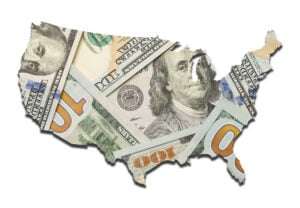
(Image via Getty)
On Monday, the Trump administration quietly published a final rule, effective October 2, that will throw up yet more barriers to legal immigration by making it really expensive. The rule says the goal is “to recover the full operating costs associated with administering” U.S. Citizenship and Immigration Services — the agency that handles applications for immigration benefits. However, the fee hikes are so high that it’s tough to avoid concluding that at least part of the reason is to discourage legal immigration.
Some background: By law, USCIS must assess its fees every two years. Normally, this doesn’t result in a remarkable increase, even though CNN and the American Immigration Council say USCIS has had financial problems for years. Without researching it, I suspect that prior administrations have not disturbed the fees very much because raising them too much would price the target audience — immigrants, who have lower median incomes than native-born Americans — out of the market.
But pricing immigrants out of the market is a goal for the Trump administration. (That includes USCIS acting director Ken Cuccinelli, a guy who once testified before Congress that he is not a white supremacist because that’s a thing that people who are not white supremacists totally need to do!) As a result, they apparently had no difficulty balancing their budget on the backs of the people they allegedly serve.
Here’s a rundown of the fee increases in the August 3 final rule:
- Applying to become a naturalized citizen went to $1,170 from $640, an 83% increase. (Last I checked, they weren’t swearing in new citizens anyway, presumably because immigrants are not generally Donald Trump voters.)
- Applying for a green card — which confers lawful permanent residency and is a necessary step toward citizenship — has been “debundled,” so that applicants have to pay separate fees for each document. This brings the total outlay to $2910 from $1760, a 65% increase.
- For the first time, a fee will apply to asylum benefits. The fee of $50 to apply for asylum might be affordable to middle-class Americans, but probably not to people who are in an ICE immigration jail. And the $550 fee to apply for a work permit is just cruel, since people applying for work permits are by definition not permitted to work.
- USCIS will no longer grant fee waivers for financial hardship unless it’s expressly required by law for the particular benefit the immigrant is applying for. The explanation for this in the Federal Register says DHS “does not agree that individuals will be prevented from filing applications,” because supporting arguments, like facts in general, are optional for some Republicans these days.
There are some eye-popping increases of well over 100% for people in specific situations, but those are the major categories.
They did pull back on two other fees. One was a proposed $275 fee for DACA renewals, which didn’t get implemented because Acting DHS Secretary Chad Wolf froze fees for DACA renewals the week before the rule was final. That memo also says the program must now be renewed every year instead of every other year, though, so DACA fees are still effectively doubled.
The other fee increase they pulled back was an insane increase of 269% to 492% for historical immigration records, which are mainly useful to genealogists. (In fact, a genealogist first brought this to my attention last year — grazie!) That makes it one of the few fee increases that directly affects native-born citizens, so it got some press coverage, and Mitt Romney sent USCIS a nastygram about it. They’re still hiking the price of a record about 300%, though, so apparently even white people get punished for caring about their roots.
Some of this has implications for the 2020 election; people who might otherwise be naturalized citizens are going to be slow-rolled out of the franchise. But most of it is the white supremacist long game, an attempt to manipulate the racial/national origin composition of the population. If you’re lucky enough to be a native-born citizen, please express your feelings about this by voting in November.
Lorelei Laird is a freelance writer specializing in the law, and the only person you know who still has an “I Believe Anita Hill” bumper sticker. Find her at wordofthelaird.com.

